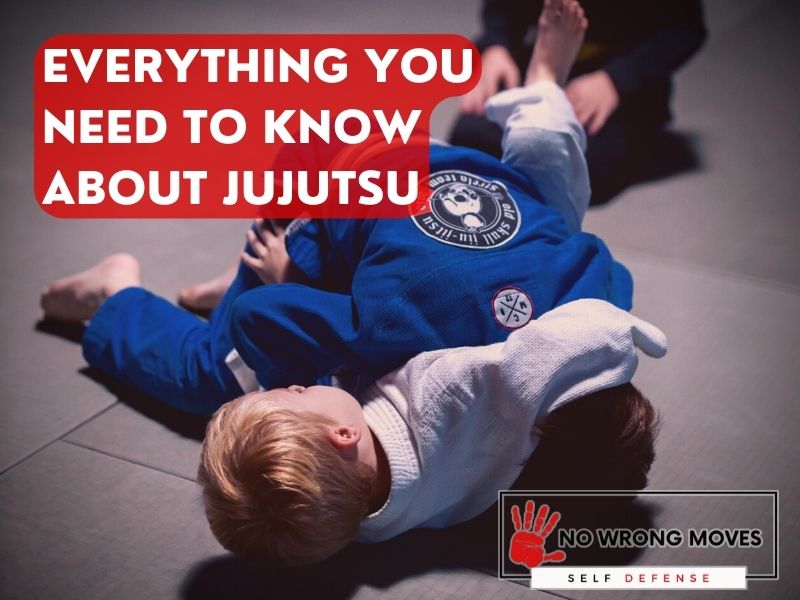
- What is This Martial Art? Everything You Need To Know About Jujutsu
- Where Does Jujutsu Come From? What’s The Story?
- Benefits of Jujutsu
- How to get started in Jujutsu
- What To Expect In Your First Jujutsu Class
- Different Jujutsu Ranks And Levels
- The Importance of A Good Jujutsu Instructor
- Jujutsu Movies and Personalities
- The Wrap-Up
Are you curious about Jujutsu? If you are, then fantastic! Trust me when I say you're making the right call. If you're eager to learn more about it, then this post has got you covered.
First, we'll define what Jujutsu actually is and where it comes from. Then once we're done with that, we'll delve into the numerous advantages of practicing this art, ranging all the way from improved physical fitness to increased self-awareness.
We'll explore the ins and outs of this incredible martial art, including its origin and benefits, and provide practical tips on how to get started. We'll also discuss what to expect in your first class, the various levels and ranks, and why finding a good teacher or class is crucial.
And if you're ready to take the leap and try it out, we'll offer some guidance on how to find the right class and what to expect in your initial training.
So without any further ado, let's jump right into it!
What is This Martial Art? Everything You Need To Know About Jujutsu
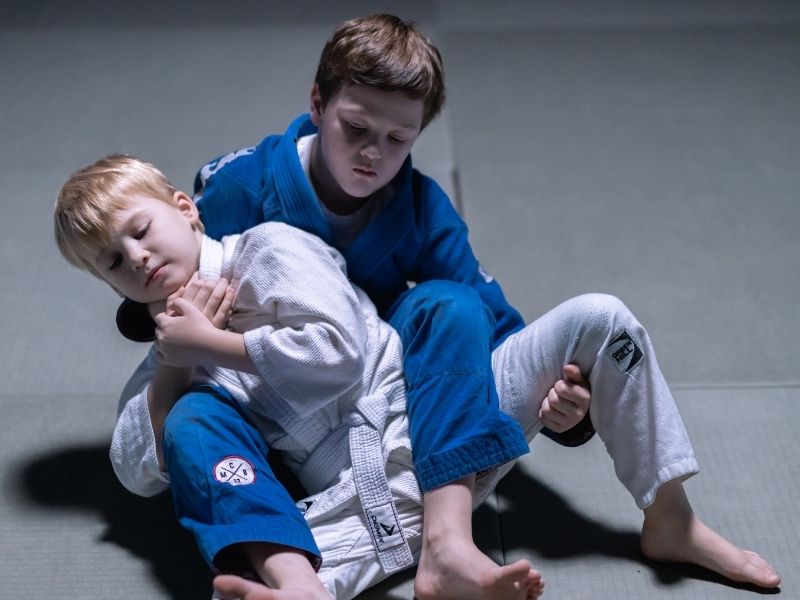
Jujutsu is a martial art that has its origins in feudal Japan. It is a versatile form of self-defense that can be used in both unarmed and armed combat. Translated literally, the word jujutsu means "the gentle art."
It's a strange thing to call a martial art, especially to the uninitiated, to be sure, but it's not without any reasonable basis. Jujutsu is primarily a close-quarters fighting style that utilizes grappling, joint locks, and throws to subdue an opponent.
Most of its maneuvers can be done without any fear of seriously harming an opponent, meaning it's a very safe martial art to learn overall. So the name makes sense in this case!
Jujutsu is also an ideal form of self-defense for women, who are often at a disadvantage when faced with a larger and stronger assailant. And in addition to its practical applications, jujutsu is also an excellent workout and can help to improve balance, coordination, and flexibility.
Where Does Jujutsu Come From? What’s The Story?
Jujutsu is a Japanese martial art and a form of self-defense.
It's generally believed to have originated in the Tenshin Shoden Katori Shinto-ryu school of swordsmanship, which was developed in the late Muromachi period (1336–1573) as a synthesis of two earlier schools, Toda-ha Buko-ryu and Takenouchi-ryu.
The oldest documentary evidence of Jujutsu is from 1532, when it was mentioned in a text called Koshukan, something compiled by a man named Honma Heishiro.
When samurai were no longer allowed to carry weapons due to the Meiji Restoration, jujutsu became even more important as a means of self-defense.
Jujutsu became even more important during the Meiji Restoration, not just because more and more people were recognizing its effectiveness, but also because back then, samurai were no longer allowed to carry weapons.
So as you can expect, the need for other, newer ways to defend yourself became much more prevalent--even without the use of weapons.
That doesn't mean Jujutsu doesn't involve any though. It still involves training in traditional weapons, such as the sword, staff, and knife. But Jujutsu techniques themselves often focus on other hand-to-hand methods, specifically joint locks, throws, strikes, and submissions.
Benefits of Jujutsu
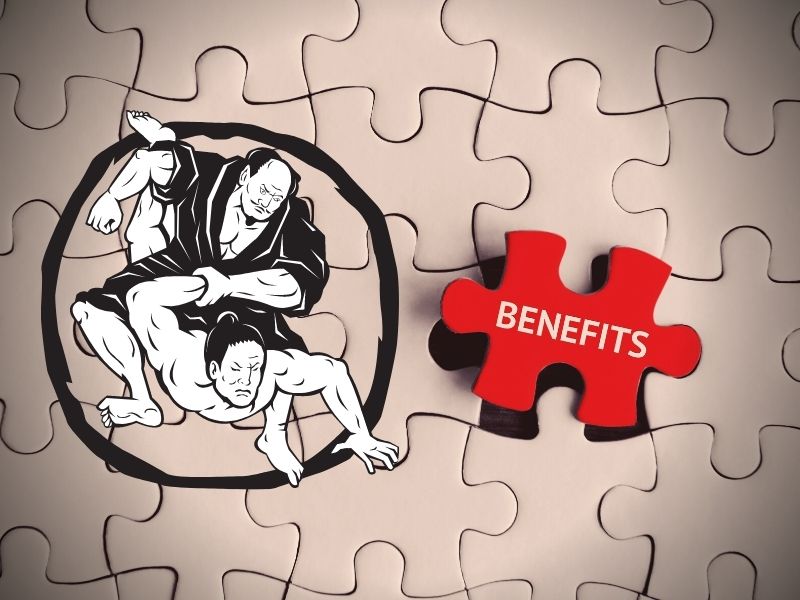
Jujutsu is a martial art that offers a multitude of benefits to its practitioners. One of the most significant advantages of practicing Jujutsu is the improvement of balance, coordination, and flexibility. As a result, you can develop a better sense of control over your body and movements.
In addition to physical improvements, this martial art can also have a positive impact on your mental health. The sport requires focus, discipline, and concentration, all of which can help to enhance your ability to stay happy, present, and engaged in various aspects of life.
Another benefit involved here is the development of your self-confidence and self-esteem. Jujutsu practice provides its students with a sense of achievement and progress as they learn new techniques and skills.
This newfound confidence can be applied to various other aspects of life, such as work, relationships, and personal goals.
Furthermore, Jujutsu can also improve your physical fitness and strength. The sport provides a full-body workout that can develop strength, endurance, flexibility, and coordination.
Regular practice can also help you lose weight and improve your overall physical condition, including the development of cardiovascular and respiratory capabilities.
Apart from these benefits, Jujutsu can also help to reduce stress and anxiety. The physical exertion and mental focus required during training can act as a form of therapy, allowing practitioners to release tension and clear their minds.
Next up, this discipline can also improve reflexes and reaction time, which can be useful in various situations. Finally, the lifestyle that accompanies the practice of Jujutsu, such as stretching and healthy eating, can contribute to an overall sense of wellbeing.
So in general, Jujutsu provides a range of benefits that extend beyond physical fitness and self-defense. The sport can have a positive impact on mental health, confidence, and overall well-being.
How to get started in Jujutsu
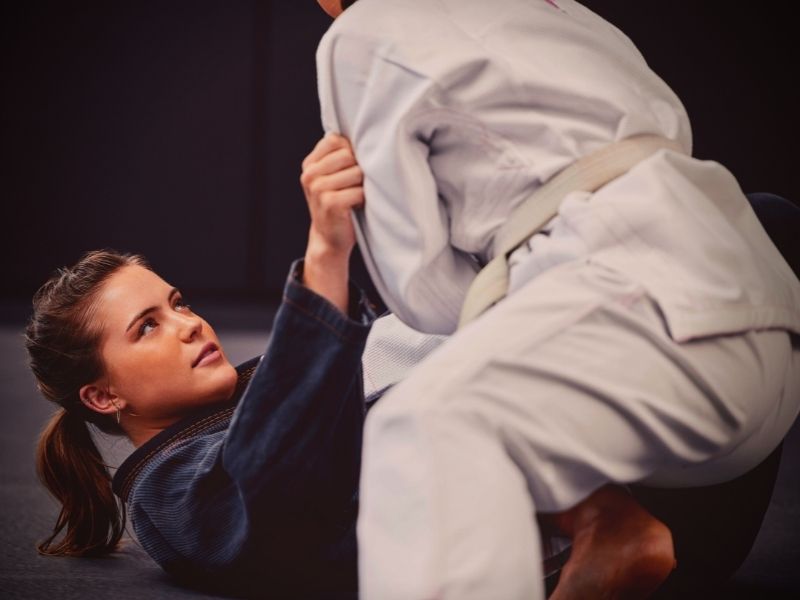
Starting your journey in Jujutsu can be both exciting and overwhelming. However, with the right mindset and approach, you can make the most out of your training experience.
To begin, it's essential to research various Jujutsu schools and find one that resonates with your personal goals and beliefs.
Once you've identified a potential school, attend a trial class to get a feel for the atmosphere and instructors. This will give you an opportunity to gauge if the school is a good fit for you.
Next, focus on learning the basic techniques, principles, and forms of Jujutsu under the guidance of a qualified instructor. You'll absolutely need consistent practice in order to develop your technique and understanding of Jujutsu's many principles.
In addition to regular practice, challenging yourself through attending workshops and seminars, sparring with other practitioners, and seeking new opportunities for growth within the Jujutsu community will accelerate your progress.
Watching and studying Jujutsu masters, both online and in competitions, can also be a great source of inspiration and new insight into the art.
Remember to approach your practice with humility and an openness to learning. That's a big part of what makes Jujutsu... well, Jujutsu, after all--a journey of continuous improvement and self-discovery.
What To Expect In Your First Jujutsu Class
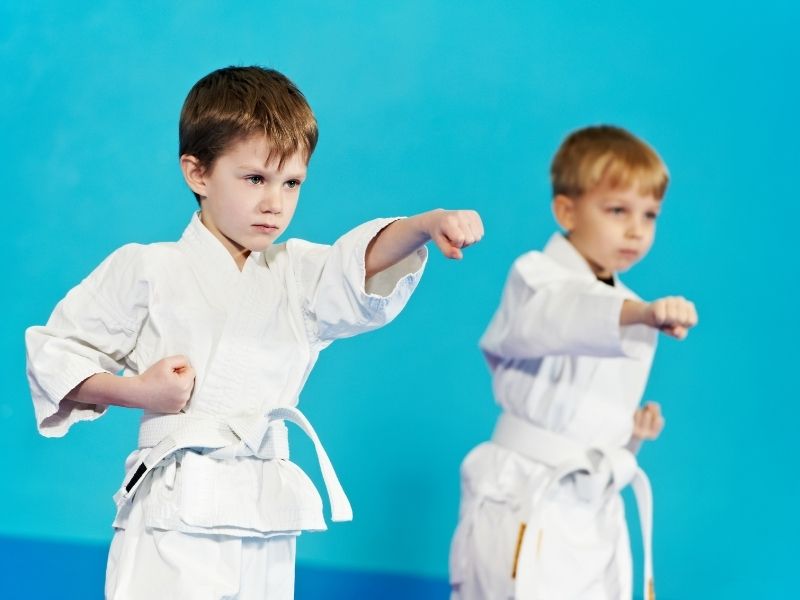
In your first Jujutsu class, you can expect to be welcomed into a supportive and encouraging environment.
Jujutsu is an exciting and dynamic martial art that will seriously challenge you physically and mentally, but it will also reward you for every ounce of effort you put into it.
Your first class will almost certainly start with a warm-up, done to get your body ready for the exercises and techniques that you'll be learning for the day. That'll include stretching, cardio, and strength training exercises.
You shouldn't underestimate these, trust me. You should expect to sweat loads and to feel pretty intense burning sensations in your muscles, as a result of heavy lactic acid build-up in your body. But don't worry, that's all part of the process!
After the warm-up, your instructor will introduce you to the basic techniques and movements of Jujutsu. That'll include things like throws and holds and eventually, they'll involve rolling with a partner.
If this sounds intimidating to you, then don't worry too much! Your instructor will guide you through each step and provide feedback to help you improve.
Finally, your first class will end with a cool-down and stretching session, done both to help prevent injuries and aid you in your recovery. Your instructor may even take some time to answer any questions you have about Jujutsu, as well as what you should expect in future classes.
So in your first Jujutsu class, you should expect to be challenged, learn new skills, and be surrounded by supportive and like-minded individuals. Things'll be tough, absolutely, but it'll be a deeply enjoyable experience too--of that, I can almost guarantee you.
Different Jujutsu Ranks And Levels
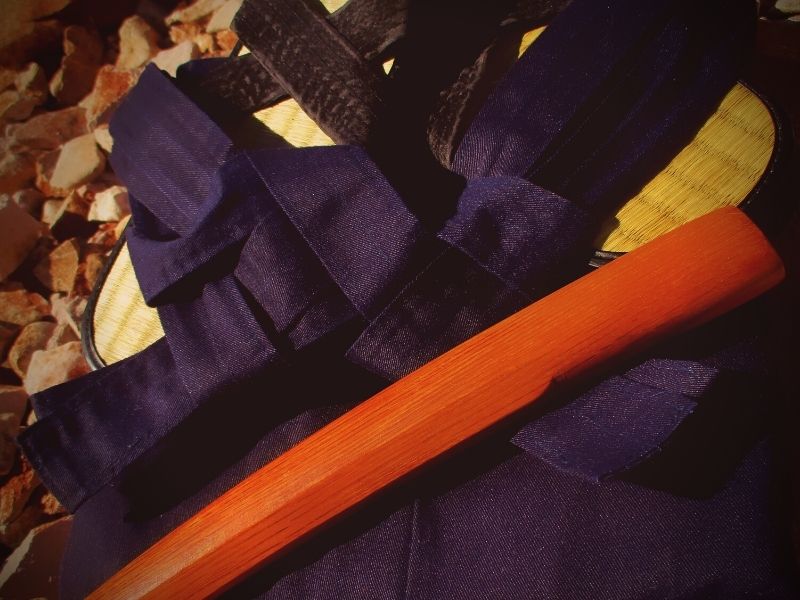
In Jujutsu, the white belt is the first belt a practitioner will earn. This rank is given to anyone new to the art and has no prerequisites.
Many instructors believe that a white belt's training should emphasize escapes and defensive positioning, as white belts often find themselves in inferior positions when training with more experienced practitioners.
Moving up in the ranks, the blue belt is the second adult rank in Jujutsu. At this level, students gain a wide breadth of technical knowledge and undergo hundreds of hours of mat time to learn how to implement moves efficiently.
Practitioners must typically be at least 16 years old to receive a blue belt, officially entering them into the adult belt system.
The purple belt is the intermediate adult ranking in Jujutsu and requires a minimum of 1.5 years to achieve.
Unlike other martial arts, where students with similar experience are often ranked as a black belt, in Jujutsu, purple belt is still considered an intermediate level.
The brown belt is the highest-ranking color belt in Jujutsu, requiring a minimum of five years of dedicated training to achieve. It's typically required that students be at least 18 years old and recommends spending a minimum of 18 months as a purple belt to be eligible for a brown belt.
Finally, the black belt is the highest common belt in Jujutsu, denoting an expert level of technical and practical skill. Generally, a practitioner must remain a black belt for a minimum of three years.
Students must normally be at least 19 years old and have a minimum of one year ranked as a brown belt to be eligible for a black belt.
The Importance of A Good Jujutsu Instructor
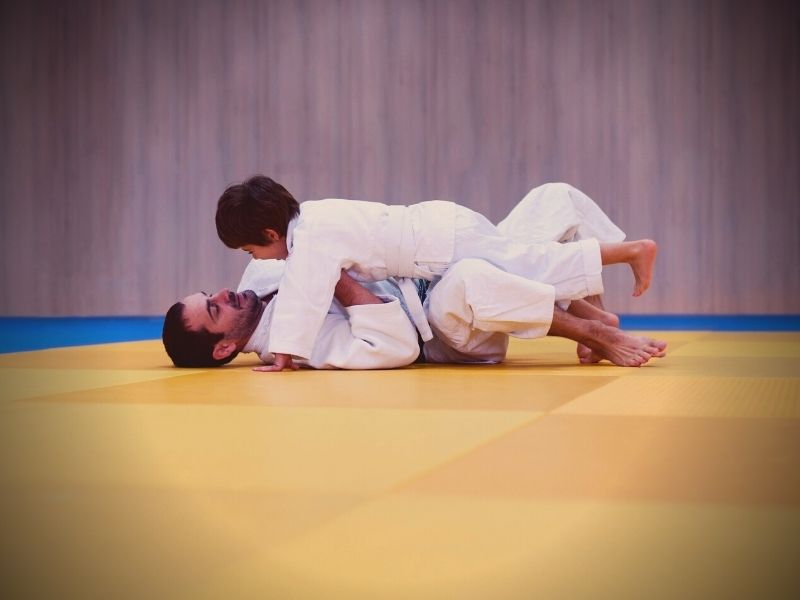
As with any martial art, it's crucial for you to choose the right Jujutsu teacher when you first start learning. A good teacher will have a deep understanding of the techniques and principles of Jujutsu and be able to communicate this knowledge to their students effectively.
They will also be able to adapt their teaching style to suit the individual needs of each student. In addition, a good teacher will be patient and supportive, and they will create a positive and encouraging learning environment.
We really can't overstate this. Choosing the right teacher is just that important for getting the most out of your Jujutsu training, so take your time and do your research before making a decision.
Jujutsu Movies and Personalities
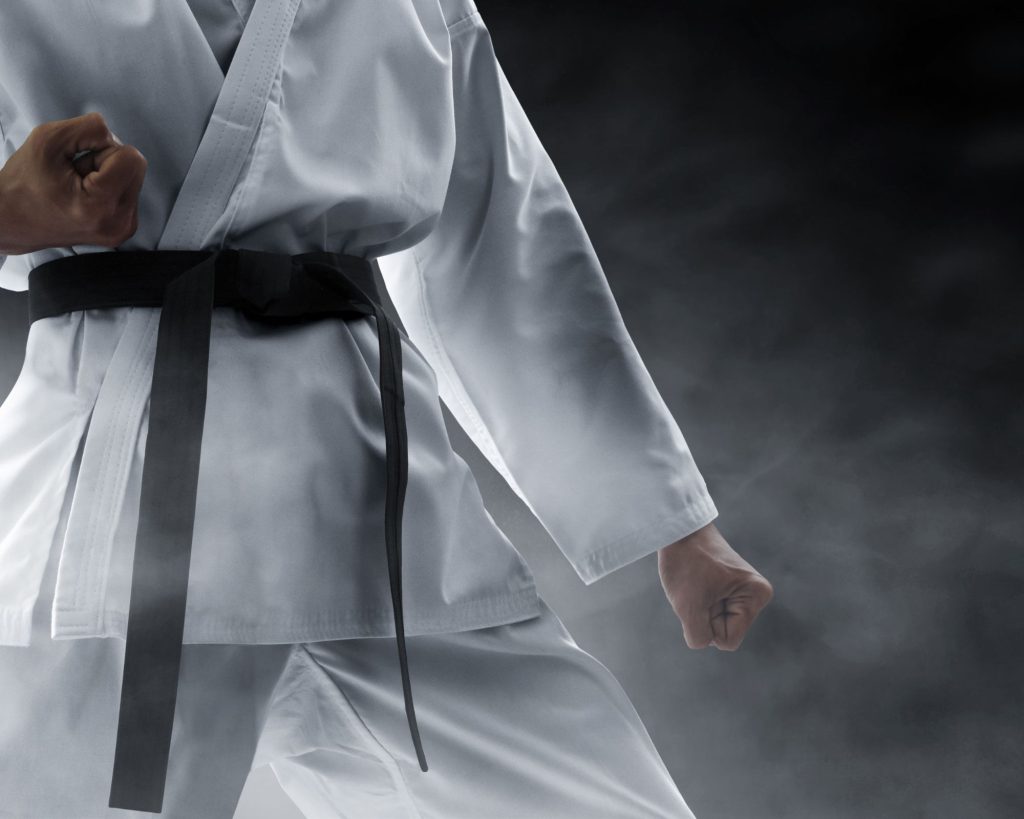
Jujutsu's been featured in quite a number of fairly popular movies, cleanly showcasing its impressive fluid movements. Some of the best movies with Jujutsu in them are:
- The Three Ninjas (1992)
- Kill Bill: Volume 1 (2003)
- The Matrix Reloaded (2003)
- 13 Assassins (2010)
- The Bourne Legacy (2012)
And, just in case you wanted to do some more research, here are some notable figures who practice or have practiced Jujutsu:
- Kano Jigoro, founder of Judo
- Hélio Gracie, co-creator of Brazilian Jiu-Jitsu
- Mitsuyo Maeda, renowned judoka who spread his knowledge of the art to Brazil
- Masahiko Kimura, judoka and professional wrestler known for defeating Hélio Gracie in a legendary match
- Antonio Inoki, Japanese professional wrestler and mixed martial artist
- Gene LeBell, American judoka and stuntman nicknamed "Judo" Gene
- Lyoto Machida, MMA fighter and former UFC Light Heavyweight Champion
- Ronda Rousey, MMA fighter and former UFC Women's Bantamweight Champion
The Wrap-Up
So! That's about all we've got for Jujutsu. As you've just read, this incredible martial art has tons to offer you.
It's got a rich history waiting for you to discover it and diverse techniques waiting for you to learn them. That's all on top of its excellent psychological benefits, excellent sense of community, opportunity to acquire self-defense skills, and offer for overall improved physical fitness.
So if you're interested in exploring this ancient martial art, I'd highly encourage you to take the first step today. Start your journey towards becoming a Jujutsu practitioner!
You'll need tons of dedication and practice, definitely, but you might find that this amazing martial art can help you achieve more than you ever thought possible.
[author-box-jpx-fitness]
